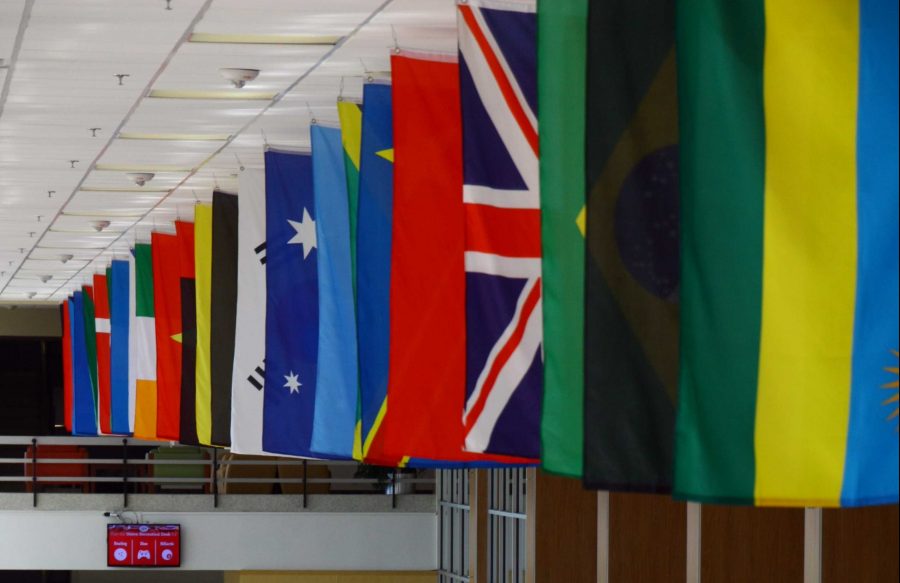The University of Utah will host its first campus-wide, organized International Education Week from Nov. 12 through Nov. 16.
International Education Week is a nationwide initiative, spearheaded by the U.S. Department of State and U.S. Department of Education. Its mission, according to the Department of State’s website, is to “prepare Americans for a global environment and attract future leaders from abroad to study, learn and exchange experiences.”
This year’s program will feature eight separate events, incorporating schools, colleges and centers from across campus. The Office for Global Engagement was critical in the organization of the events.
“All of the institutions this year are coordinating around the Office for Global Engagement,” said Kathryn Timm, the Learning Abroad Coordinator and Learning Abroad Scholarships Team Lead. “They have been really supportive in bringing everyone together. Starting this year, colleges that have already been engaged in activities are organizing together. Specific groups didn’t apply for anything or were selected for specific reasons, they’re involved because they were already going to do something, and we decided to coordinate efforts.”
Many organizations have been involved in the planning of events, or are hosting, including the College of Engineering, the College of Humanities, Learning Abroad and the Office of Global Engagement, the School of Business, the Hinckley Institute of Politics, International Student Scholar Services (ISSS), ASUU, International Student Council and the international studies major.
The week will begin on Monday, Nov. 12 with the Engineering Abroad Panel, where engineering students will speak on navigating international study and internships abroad within the major and field of study. Many other entities, on and off campus, will be involved, including Brian Johnson, a U alumnus, current lecturer and past CFO of IBM Japan, who will be featured as a guest speaker, along with returned students who completed global Hinckley internships. The week also features a Diversity Abroad Panel, where faculty, staff and alumni will discuss identity and global experience. The Panel will be partially funded by Cultural Experiences Abroad (CEA), an affiliate of the U involved in helping students study abroad.
The programming will conclude with International Night, an event organized by international student council, aimed at celebrating the international student diversity at the U. The celebration will include a fashion show, food, dancing, poetry reading, singing, martial arts displays and more.
“All of us have something to learn about our place in the world, and the global impact that we have as college students, staff and citizens of any particular country,” Timms said. “We have something to gain from interacting with people from other countries, and that’s what this week is all about. International Education Week provides opportunities to learn from others and about opportunities to go abroad to study and work, as well as about the global impact of the careers students might choose to go into.”
For more information about International Education Week and its origins, visit https://iew.state.gov/. To learn more about the events organized through the U, as well as dates, times and locations of the events, visit the Global Engagement’s website.




lance johnson • Nov 4, 2018 at 11:24 am
IE Week is an important event because being an international student away from home is difficult, compounded by our complex culture and language problems. Welcoming and assimilation assistance must come from numerous sources, including the White House, to aid these young people embarking on life’s journey. Most struggle in their efforts and need guidance from schools’ international departments, immigration protection, host families, concerned neighbors and fellow students, and even informative books to extend a cultural helping hand.
Something that might help anyone coming to the US is the award-winning worldwide book/ebook “What Foreigners Need To Know About America From A To Z: How to Understand Crazy American Culture, People, Government, Business, Language and More.” Used in foreign Fulbright student programs and endorsed worldwide by ambassadors, educators, and editors, it identifies how “foreigners” have become successful in the US, including students.
It explains how to cope with a confusing new culture and friendship process, and daunting classroom differences. It explains how US businesses operate and how to get a job (which differs from most countries), a must for those who want to work with/for an American firm here or overseas.
It also identifies the most common English grammar and speech problems foreigners have and tips for easily overcoming them, the number one stumbling block they say they have to succeeding here.
Good luck to all wherever you study or wherever you come from, because that is the TRUE spirit of the American PEOPLE, not a few in government who shout the loudest! Supporters of int’l students must shout louder.